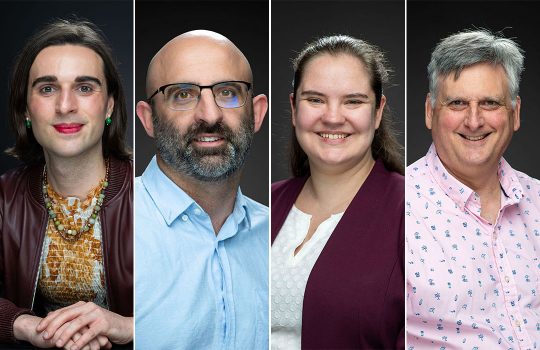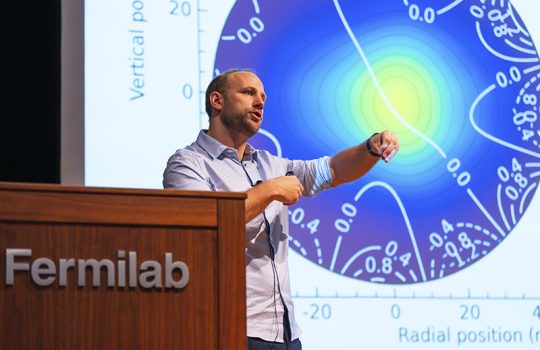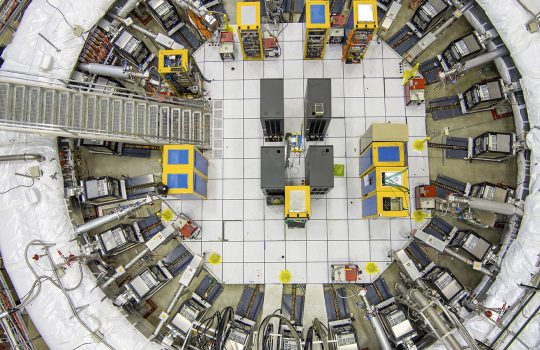Fermilab plans public celebration to welcome the ring home
For the past month, a 50-foot-wide circular electromagnet has been on a fantastic journey between two U.S. Department of Energy national labs: Brookhaven National Laboratory in New York and Fermi National Accelerator Laboratory in Illinois. On Friday, July 26, that voyage is expected to conclude. Fermilab is planning a party to celebrate the ring’s safe arrival, and everyone’s invited.
The magnet is the centerpiece of Fermilab’s new Muon g-2 experiment, which will study the properties of elusive subatomic particles called muons. The ring was built at Brookhaven National Laboratory in the 1990s for a similar experiment, one which found tantalizing hints of new physics beyond what scientists have observed. Fermilab will conduct a similar experiment with the most powerful beam of muons in the world, an experiment that could open up new realms of scientific discovery.
Moving the ring from New York to Illinois costs roughly 10 times less than building a new one. So the magnet – essentially three rings of aluminum with superconducting coils inside – has spent the last few weeks on a barge, heading down the east coast, around the tip of Florida, into the Gulf of Mexico and then up a series of rivers toward Lemont, Illinois.
It’s been a tricky voyage, because the 17-ton ring cannot be taken apart, or twisted more than a few degrees without irreparably damaging the coils inside.
The ring is expected to arrive in Lemont this weekend, and will be moved from the barge to a specially adapted truck, which will drive it along interstate routes and through suburban streets to Fermilab over three consecutive nights next week. The ring will move at night, using rolling roadblocks to close off intersections, and will utilize portions of I-355 and I-88, along with a series of local roads. Check http://muon-g-2.fnal.gov/bigmove for a map and frequent updates.
The electromagnet is expected to arrive on the Fermilab site early Thursday or Friday morning, July 25 or 26.
“It’s been a very long journey, and it took a lot of work from dozens of people,” said Chris Polly, the project’s manager at Fermilab. “Now that it’s almost here, the excitement is building. We’re eager to get the magnet here and start the experiment.”
On the afternoon of July 26, the ring will move those last few miles across the Fermilab site. The public is invited to come celebrate the ring’s arrival along with Fermilab scientists and employees, starting at 5:30 p.m. at Wilson Hall. There will be hands-on activities for the whole family, and scientists on the Muon g-2 experiment will be on hand to answer questions.
When the ring arrives at Wilson Hall, the action will move outside. Attendees will be able to watch the ring roll past the reflecting pond in front of Wilson Hall, and they will have the opportunity to pose for a massive group photo with the magnet before it moves to its final destination.
“A 50-foot-wide electromagnet rolling down a road is really something to see,” said David Hertzog of the University of Washington, co-spokesman for the Muon g-2 experiment. “As excited as we are about the new physics this experiment may uncover, we’re equally thrilled to see the magnet making its last few steps home.”
Details of the Fermilab celebration are posted on http://muon-g-2.fnal.gov/bigmove, along with a GPS-powered map that shows the location of the magnet on its journey. Updates will be posted to that site, both before and during the move along the Illinois roadways. The celebration could be delayed by inclement weather. Check the Big Move site for updates. For more information, call the Office of Communication at 630-840-3351.
Fermilab is America’s premier national laboratory for particle physics research. A U.S. Department of Energy Office of Science laboratory, Fermilab is located near Chicago, Illinois, and operated under contract by the Fermi Research Alliance, LLC. Visit Fermilab’s website at www.fnal.gov and follow us on Twitter at @FermilabToday.
The DOE Office of Science is the single largest supporter of basic research in the physical sciences in the United States, and is working to address some of the most pressing challenges of our time. For more information, please visit science.energy.gov.



